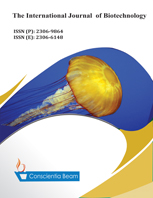Production of Biosurfactants Using Pseudomonas Aeruginosa for Biodegradation of Herbicide
DOI:
https://doi.org/10.18488/journal.57.2019.81.66.74Abstract
This study was aimed at isolating Pseudomonas aeruginosa from the soil to produce biosurfactant for degradation of herbicide. The soil sample was collected from oil polluted site in mechanic workshop, Minna, Niger State, Nigeria and transferred to the microbiology laboratory of the University in a sterile polyethylene bag. Pseudomonas aeruginosa was isolated from the soil and identified using microbiological and biochemical assays. The isolate was screened for biosurfactant production using haemolytic assay, drop collapse, oil spreading and emulsification test. Biosurfactant production was carried out using mineral salt medium for ten days. The ability of the biosurfactant produced by P. aeruginosa in degrading herbicide was tested on five concentrations of herbicide (5%, 10%, 30%, 50%, 70%) and the results showed biodegradation percentages as 56.4%, 53.1%, 32.6%, 29.8% and 26.2% respectively revealing that degradation was higher at lower concentrations. This suggests that herbicide could be biodegraded especially at low concentrations using biosurfactant produced by Pseudomonas aeruginosa.

